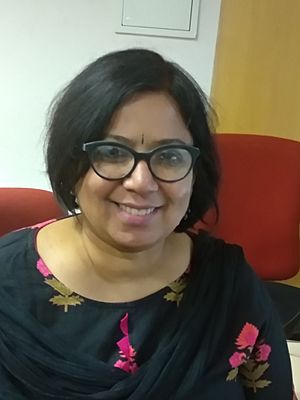Shobhana Narasimhan facts for kids
Quick facts for kids
Shobhana Narasimhan
|
|
|---|---|
 |
|
| Nationality | Indian |
| Alma mater | Harvard University, Indian Institute of Technology Bombay, St. Xavier's College, Mumbai |
| Awards | Stree Shakti Samman Science Award, 2010, Kalpana Chawla Woman Scientist Award of the Government of Karnataka, 2010 |
| Scientific career | |
| Fields | Computational Nanoscience |
| Institutions | Jawaharlal Nehru Centre for Advanced Scientific Research |
| Doctoral advisor | David Vanderbilt |
Shobhana Narasimhan is an Indian scientist and professor. She works at the Jawaharlal Nehru Centre for Advanced Scientific Research (JNCASR) in Bangalore, India. Her main work is in a field called computational nanoscience. This means she uses computers to study very, very tiny materials. She looks at how materials change when they become super small. She is also an important member of several science groups, like the American Academy of Arts and Sciences.
Contents
Education and Early Career
Shobhana Narasimhan studied physics in college. She earned her first degree from St. Xavier's College, Mumbai in 1983. Then, she got her master's degree from IIT Bombay in 1985. She went on to get her Ph.D. in Theoretical Physics from Harvard University in 1991. Her advisor there was David Vanderbilt.
After her Ph.D., she worked as a researcher at places like Brookhaven National Laboratory in the USA. She also worked at the Fritz Haber Institute of the Max Planck Society in Germany. In 1996, she joined the JNCASR in Bangalore, India, as a professor. She later became the head of the Theoretical Sciences Unit and the Dean of Academic Affairs at JNCASR.
Exploring Tiny Materials
Professor Narasimhan's research group studies the amazing properties of materials at the nanoscale. The "nanoscale" means things that are incredibly small, like a billionth of a meter! Her team uses powerful computer methods, especially something called quantum mechanical density functional theory. This helps them understand how materials behave at this tiny level.
They use these computer calculations to design new materials with special abilities. They don't need to do many experiments in a lab at first. Instead, they use computers to predict how materials will act. This research helps create new things like special materials for clean energy or better ways to store data on computers.
Some of the cool things her group has explored include:
- Designing Catalysts: Catalysts are substances that speed up chemical reactions. Her group has studied how tiny gold particles change shape when placed on certain surfaces. This helps make better catalysts.
- Mixing and Magnetism: They've looked at how different metals mix on surfaces. They found that magnetism can actually help metals mix, even if they normally wouldn't.
- Storing Gases: Her team has worked on ways to store gases like hydrogen for future energy needs. They use computer models to find the best materials for this.
Her group also explores spintronics. This is a new field that uses the "spin" of electrons to control things like magnetism. They are looking for new ways to use magnetism at the nanoscale.
Teaching and Helping Women in Science
Professor Narasimhan loves to teach and find new ways to help students learn. She has led and joined many workshops in countries all over the world, including China, Ethiopia, South Africa, and India. She has taught about solid state physics and density functional theory in these workshops.
She is also very passionate about helping more women get involved in science. She was part of important groups like the Working Group on Women in Physics. She has given advice to governments on how to make policies that support women in science. Some of her ideas include having women on hiring committees and offering flexible work hours and longer maternity leave.
Since 2013, she has organized workshops for women physicists. These workshops help women develop their careers. She also studied why women sometimes leave physics careers and how taking a break might affect them. She looks for ways to keep more women in science.
Awards and Recognition
Professor Narasimhan has received many awards for her work. In 2021, she was named one of the Asian Scientist 100 by Asian Scientist magazine. In 2022, she became a Fellow of the American Physical Society. This award recognized her important work in promoting diversity and fighting unfair treatment in physics. It also honored her for creating career development workshops that have greatly helped many women physicists.
Public Talks
Professor Narasimhan often gives talks about her research and about women in science.
Technical Presentations
- Agents of Change: The Role of Catalysts in Modern World
- Using Descriptors to Design Novel Nanomaterials
- New Horizons in Physics
- Rational Design of Catalysts
- How to write research articles
Talks on Women in STEM
- Why it is (still) difficult to be a woman in science
- “No longer alone!”: Career Development Workshops for Women in Physics
- Indian Women in Stem
See also
 In Spanish: Shobhana Narasimhan para niños
In Spanish: Shobhana Narasimhan para niños
 | Madam C. J. Walker |
 | Janet Emerson Bashen |
 | Annie Turnbo Malone |
 | Maggie L. Walker |

